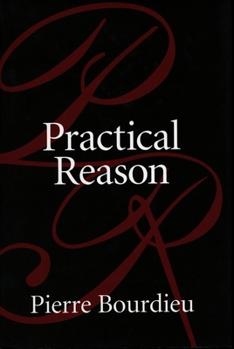Practical Reason: On the Theory of Action
Select Format
Select Condition 
Book Overview
Do social classes really exist? Is disinterested action really possible? What do the family, the church, and the intellectual world have in common? Can morality be founded on hypocrisy? What is the "subject" of action? In this new volume, one of France's foremost social thinkers of our time responds to these major questions and to others, thus tracing the outlines of a work that could be called "Pierre Bourdieu by himself." In these texts,...
Format:Paperback
Language:English
ISBN:0804733635
ISBN13:9780804733632
Release Date:July 1998
Publisher:Stanford University Press
Length:168 Pages
Weight:0.64 lbs.
Dimensions:0.4" x 5.8" x 9.3"
Customer Reviews
3 ratings
An excellent invitation, but not sufficient in itself
Published by Thriftbooks.com User , 17 years ago
This book, a collection of various articles written by Bourdieu, serves as an excellent invitation to Bourdieu's oeuvre. It provides some introduction to key concepts, and introduces the reader, through important selections, to the logic and presentation of Bourdieu's thought. The book covers various niches of Bourdieu's study, from symbolic violence to ethics to aesthetics to Kabyle gift-giving, and so on. While it is not sufficient in of itself as a complete introduction to Bourdieu's vast works, it serves as an enticing appetizer, inviting the reader to delve deeper into the ingeneous system of understandings that Bourdieu has constructed. Bourdieu synthesizes a wide range of intellectual precursers, from Weber, Marx, Merleau-Ponty, Mauss, and many others. This is certainly evident, though primarily in a latent fashion, in "Practical Reason." Practical Reason is excellent as a very broad, very general, but insufficient introduction to Bourdieu's thought. Some of the most important articles in this collection are "Genesis of the State" and "The New Capital." These articles should not be seen as, in themselves, sufficient to understanding Bourdieu. Rather, they serve to sensitize the reader to the peculiar presentation (both cognitive and linguistic) that characterizes Bourdieu's work. Bourdieu is noted for being a very inpenetrable reader, and this is a very purposeful strategy employed by Bourdieu in order to break free of the presuppositions inherent in ordinary language constructions. If you plan on reading more Bourdieu, Practical Reason is a very appropriate starting-point, as a collection of articles that only begins to habituate the reader. However, it must be read as part of a greater project, reading other works by Bourdieu. If you only want to get a general idea of his theories, read "An Invitation to Reflexive Sociology". You may also wish to look at "The Logic of Practice" and "Outline of a Theory of Practice (Cambridge Studies in Social and Cultural Anthropology)" which are both supposed to be standard introductions into Bourdieu's work.
Excellent Introduction to a Prolific Writer
Published by Thriftbooks.com User , 20 years ago
A difficulty with approaching such a prolific author as Bourdieu is determining where one should begin reading. This short, 150-page book composed of mostly lectures and concise essays serves as an excellent beginning to not only gaining a grasp of the key ideas put forth by Bourdieu..., but also, insofar as Bourdieu throughout the work is reviewing a lifetime of sociological writing, it serves as an excellent topical mapping of his previous works giving small tastes of previous studies on Kabylia, Distinction, Homo Academicus, etc. While there are moments when the brevity of treatment makes for a meager argument, I would nonetheless recommend this book to anyone with a desire to begin exploring the works and ideas of Bourdieu.
Best Introduction to Bourdieusian Thought Available
Published by Thriftbooks.com User , 24 years ago
It's not very often that an author is able to take a highly complex set of work(s) and summarize them into an easily read and understood piece. While the overviews offered by scholars of Bourdieu, such as Swartz's _Culture and Power_ or Bourdieu and Wacquant's _Invitation to Reflexive Sociology_ prove a broad overview of Bourdieu's work, they generally require that the reader be well versed in the specifics of Bourdieusian analysis to be able to take full advantage of them. In _Practical Reason_, Bourdieu provides a comprehensive overview of his major ideas, including field, habitus, capital, and reflexivity. He does this without weighting his writing down by citing himself constantly (the difficulty with Swartz) or by bogging himself down in long and confusing questions posited by the analysis of an Other (the difficulty with _Invitation_).Instead, Bourdieu offers a clearer invitation. Rather than being placed into the position of an outside observer who is being addressed as the Third Person - the audience member - in _Practical Reason_ Bourdieu engages in an exposition of his idea, with you as the only audience member. Not only is this more comfortable to read than being placed into the position of the voyeur of others' conversation, but it also allows a direct interaction with the author.Another aspect that makes this text an enjoyable introduction is that unlike _Outline of a Theory of Practice_ (the usual entry to Bourdieu) or _The Logic of Practice_, there is much less ethnography to transport the reader into a confusion of cultural (mis)understanding. Of course, for readers who are used to Bourdieu's complex sentences and are familiar with his theory, the lack of direct application may be frustrating, as _Practical Reason_ does not range far beyond theoretical exposition.However, for first time students and readers who may wish to know more about the ideas of one of France's (and the world's) leading sociological minds, this book is the most comprehensive and understandable introductions available.





